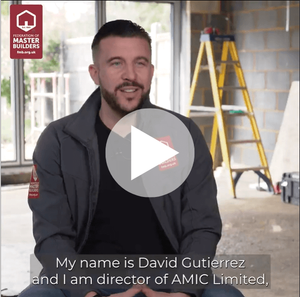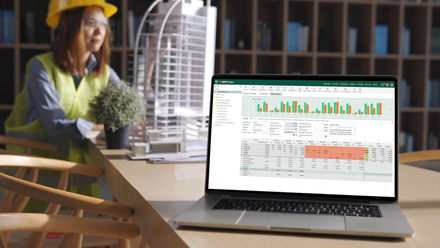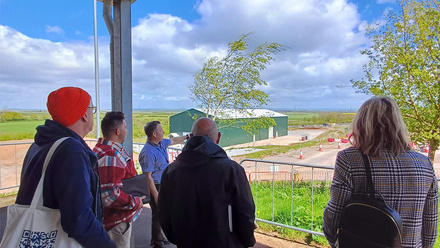When you’re growing your construction business, it can be hard to find a balance between managing your business and being on the tools. To develop and grow, you need to spend more time on building relationships with your clients, keeping paperwork up to date and marketing to spread the word. There may come a time when you need to get off the tools to free up your time – and knowing when to take that step can be daunting.
We caught up with two FMB members about their experiences.
Taking the family business back to basics
FMB member company George Fair Joiners & Contractors Ltd has been operating in Scotland for half a century. In 2017, Ryan Fair took over the family business after his father, George, suffered a stroke. Despite having spent more than 20 years at the company, taking on the role of company leader was a difficult task.
‘My dad lost his sight and mobility, so I had to take over’ Ryan says. He struggled to get payments from some who were using his father’s health as a delay tactic, and this forced him to downsize the company to just himself and one labourer. ‘We had to get through that, basically starting again from scratch.’

Ryan has turned the business around and now employs nine people. He came off the tools two years ago, calling it an inevitability if the business was to continue.
‘If you’re taking 30 phone calls a day and spending two hours a day on the tools, and meeting with architects and structural engineers, you're just not making progress,’ Ryan says. ‘So it’s a natural sort of transition to get off the tools or you become frustrated working late to catch up and get stuff done.’
Finding the right people to help you grow
Like many small builders, David Gutierrez, who founded Amic Ltd in 2004, was juggling many responsibilities. ‘When I was on the tools, it would be from 8am to 5pm. Then I’d meet with clients and do my paperwork and pricing for the work until around 9pm or 10pm. You sit in the office till late. Then you're back to work. Sometimes I work on my drawings when the lads are having their lunch. And if it's a massive job, it spills into the weekend. That will give you an outlook on how much life I'm left with.’

While long unsociable hours come hand in hand with starting a new business, they aren’t sustainable in the long term, either for business growth or personal wellbeing. There comes a time when you need to step back and focus on business development – but that’s often not straightforward.
‘It isn't me being a control freak or a perfectionist – although I am both – it’s the fact that people are not able to do the work I do, and I struggle to find anybody good enough for me to be happy about leaving them to it for the client,’ David explained. ‘There aren’t any guys out there, apart from older guys who are retiring or looking at a different line of work because of the wear and tear on their bodies. The skills shortage is the only thing keeping me away from fully coming off the tools.’
Sometimes, the opportunity to come off the tools comes when you meet the right person. David has recently stepped away from hands-on building work by partnering with a long-time friend on a new joint business venture – showing that you sometimes need to think strategically outside the box.
Tips to get off the tools
From speaking to our members, we know that having these five key business skills in your ‘toolkit’ are essential for getting off the tools:
1. Experience
You know all there is to know about your trade, with a track record of rectifying any mistakes made.
You’ve put the time in and reached the point where you are confident with your knowledge. You’re able to troubleshoot problems and resolve issues with a positive outcome for both your clients and your business. One stumbling block faced by many business owners when considering how to get off the tools is an over-reliance on your availability through the day to help with queries, pain points and the day-to-day logistics of a building site. Which is where getting off the tools and growing your business becomes a team effort.
2. People management
You know how to manage teams. You'll naturally gain respect and trust from those around you if you're a good communicator, with integrity in everything you do.
Moving off the tools inevitably means delegating some of your non-strategic decision making to your team. Look at who can take on additional responsibility in your team and what support they need from you to do this. For some businesses, this could involve external recruitment to find the right person for the job.
Swapping the tools for business development requires strategy and processes. David Gutierrez initially proposed a two-stage approach to this for his business. The first part involved hiring someone to help run projects and business admin so he could spend more time employing people and overseeing the quality of work on site. Part two involved finding someone to take over quality control on site to free him up to work on other tasks such as winning new work.
David told us: ‘We are nothing without our staff. So long as the staff's performing and as long as they’ve got our support and they’re getting paid the right money, then we can focus on getting off the tools.’
3. Training
You invest, train and have faith in your staff to take on more responsibility.
It will take time and money to train someone to take on your responsibilities, but David says to think of it as 'reinvesting in your business', which will pay off in the future.
Do you find yourself taking on tasks onsite because you ‘just want the job done right first time’? Learning when to delegate can be difficult for some, but it’s a necessary step when you’re growing your business. Curating a good team to support you is key, and it’s also a chance for them to grow into new roles and responsibilities.
Ryan Fair agrees: ‘You need a good team, but it doesn't happen overnight. Tradesmen like coming in to work and going home at five o'clock with no pressure. So start slow. Just give them responsibility and let that build up to a point rather than throwing them into it. That tends to work better because they have not noticed.’
‘I give everybody a little bit more responsibility, a little bit at a time.’ Examples include making one or two team members responsible for fuel cards and vehicles, another is given the task of making a materials order list rather than doing it himself.
4. Regulations
You keep up to date with industry regulations and laws.
Keeping up to date with changes to regulations in the industry is part of running any business, but this can take on greater importance as your business grows. Understanding the latest requirements and changes to health and safety regulations, planning, HR, insurance and tax can stand you in good stead as you gradually take on more employees and scale up the number of sites or type of projects you’re working on.
As a member of the FMB, you can access business support to help with this, including:
- Online learning
- Contract templates
- Business document templates
- Specialist helplines for human resources, legal and debt recovery, tax and VAT, insurance and more
- Safety Plus at a special member rate – Health and Safety software that’s built for the construction industry
5. Learning
You have upskilled on the basics of marketing, finance and project management helping you build a well-rounded approach to business.
Learning isn’t just about online courses and classes that eat into your working day or personal life. Learning from others is part of this too. This can be as simple as paying attention to other companies in meetings - you never know what you will pick up that you can apply to your business. Another great way to learn from others is through networking, whether that’s through local groups, or by joining a trade organisation like the FMB. We hold regional and national in-person events for our members, along with virtual events and webinars on a range of business topics that can help you to connect with other construction business owners and help you to grow your business.
David Guttierez spoke about how he’s benefitted from being an FMB member: ‘So I’ve been a member of the FMB from 2012. They give loads of support like online training, which is really helpful. You can also attend loads of networking events and bounce off other members, then when you’re on site you can give them a call if you’re unsure about something. So it’s become a bit of a family.’





